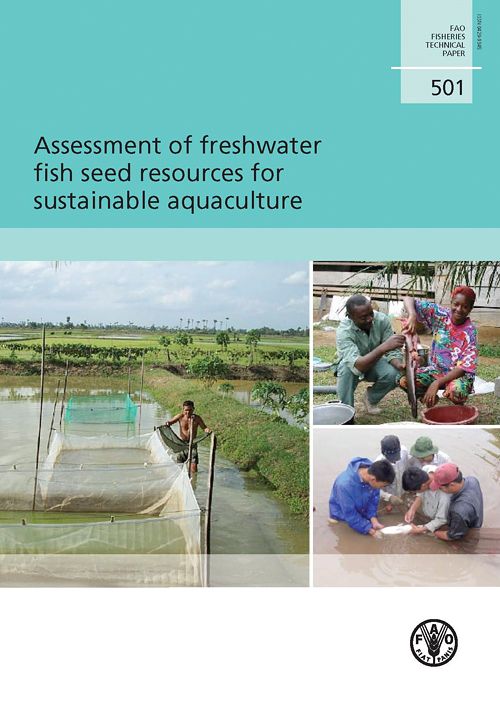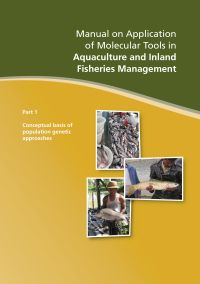Assessment of freshwater fish seed resources for sustainable aquaculture
17 April 2008 | Melba G. Bondad-Reantaso (ed.) | 6019 Downloads | .pdf | 9.61 MB | Freshwater finfish, Gender, Genetics and Biodiversity, Hatchery and nursery, Inland aquaculture, Environment and Sustainability
Four of the most important resources to aquaculture, outside human and technological resources, are land, water, seed and feed. Efficient use of these resources are necessary to guarantee optimum production from aquaculture. A number of regional and international events highlighted some of the most pressing issues concerning seed in global aquaculture development. These include inadequate and unreliable supply of quality seed, genetic quality, inadequate hatchery technology and facilities for rearing fry/fingerlings, distribution mechanisms, impacts of releases of cultured seed stocks, the need for more hatcheries with business orientation and others. In order to secure stable seed supply for major freshwater aquaculture species, factors affecting seed availability, seed quality, seed production technologies and support services, seed distribution networks, breeding technologies, genetic improvement and domestication need to be understood well if resources are best to be targeted and policy decisions on future investment and management options improved.
Recognising these issues, a project Study and Analysis of Seed Production in Small-scale Rural Aquaculture was undertaken by the Aquaculture Management and Conservation Service of FAO’s Department of Fisheries and Aquaculture. The project was implemented through a desk study and an expert workshop to assess the status of freshwater fish seed resources and supply and its contribution to sustainable aquatic production. The desk study, undertaken between July 2005 and April 2006, consisted of: (i) country-level assessment, (ii) regional syntheses and (iii) thematic reviews. The FAO Expert Workshop on Freshwater Seed as Global Resource for Aquaculture, held in Wuxi, China, from 23 to 26 March 2006 and hosted by the Wuxi Freshwater Fisheries Research Center, Chinese Academy of Fisheries Sciences, was aimed at analysing the current status of the freshwater seed sector used in aquaculture with special emphasis on rural aquaculture and evaluating the current constraints and challenges as basis for identifying measures and generating action that will contribute to the sustainable development of this sector.
This publication is presented in two parts. Part 1 contains the proceedings and major recommendations of the expert workshop which tackled three major themes: (1) seed quality, genetics, technology and certification; (2) seed networking, distribution, entrepreneurship and certification; and (3) how rural fish farmers can benefit from the freshwater aquaseed sector. Part 2 contains the detailed outcomes of the desk study consisting of three regional syntheses (Africa, Asia and Latin America) based on 21 country case studies (Bangladesh, Brazil, Cambodia, Cameroon, China, Colombia, Cuba, Ecuador, Egypt, Ghana, India, Indonesia, Mexico, Nigeria, Pakistan, the Philippines, Sri Lanka, Thailand, Uganda, Viet Nam and Zimbabwe), five thematic reviews (seed quality, genetics and breeding in seed supply for inland aquaculture, seed networks and entrepreneurship, role of seed supply in rural aquaculture, farmer innovations and women involvement in seed production) and three invited papers (self-recruiting species, decentralised seed networking in Bangladesh and establishment of national broodstock centres in Viet Nam).
Copyright, all rights reserved.

